It felt like a slower-than-usual day. But then, on the morning after, I noticed a tender area a few inches to the right of my belly-button—not coincidentally, the place where I anchor the butt of my rod when I’m fighting a fish from a boat. The lesson being, I think, that even a slow day of smallmouth fishing on the lower Wisconsin River is still pretty good.
We didn’t get rained on, either, which, given the predictions and the sullen skies all around us, was a minor miracle. Our guide, Kyle Zempel—proprietor of the Black Earth Angling Company and the pioneer of fly-fishing for smallmouth on the lower Wisconsin—had pushed back our mid-June date 24 hours in order to avoid whitecap-propagating winds and blistering 90-degree heat. When I pulled up the forecast, though, it looked as if we were simply trading one shit sandwich for another, and I said as much in a text to my fishing partner, Winston Ostrow. True to form, Winston—a student of Zen and the very embodiment of the Waltonian philosopher-angler—counseled patience and a positive attitude.
Sound advice, but I’d expect nothing less from the Sage of the Driftless. And when I stopped enroute to our overnight destination for a butterscotch malt at Milty Wilty, an iconic 1940s-vintage drive-in that I’m almost unreasonably fond of, my mood turned positively sunny.
It turned out to be a hell of a pleasant day to be on the water. The temps stayed steady in the mid- to upper-70s, the rain went around us, the sun peeked out only occasionally, the wind was light to nonexistent. If anything we could have used a little more wind; a wet late-spring/early-summer had produced a bumper crop of mosquitoes, and whenever we fished a stretch of the “main” shoreline, as opposed to the mid-river islands and sandbars, they showed us no mercy. This had troubling implications for Kyle, as it augured inauspiciously for the esprit de corps at his upcoming “Crash Camps”—immersive, multi-day Wisconsin River camping-fishing excursions.
Read: Hard to enjoy a festive sing-a-long around the campfire when you’re enveloped by a smothering misery of mosquitoes, whether you’re slathered in Picaridin or not.

The term “crash,” in case you’re not familiar with it, refers to the way the smallmouth of the lower Wisconsin gang up savagely on schools of emerald shiners and, in so doing, transform formerly unremarkable pieces of water into something resembling a seething cauldron. It’s perfectly analogous to what stripers and bluefish do to menhaden, alewives, etc. in the salt, and it seems to be a behavior unique to the smallmouth of this particular ecosystem. I’ve never heard of it happening anywhere else in smallmouth country, anyway.
More Like This
It’s an impressive sight—there’s a serious Wow! factor—and it has an especially galvanizing effect if you’re (A) holding a fly rod in your hand and (B) happen to be in casting range. This, of course, is the specific attraction of the fishery: the chance to cast to crashing smallies. You watch for where the water’s boiling, put your fly there, and hang on. It may not be a guaranteed strike but, short of dropping a worm in front of a school of sunfish, it’s as close to one as any “presentation” I’m aware of.
And while we (meaning Kyle) had to hunt hard—and while the crashes we encountered were a bit on the subdued side compared to some that we’ve experienced—we found more than enough willing fish to keep us engaged, put smiles on our faces and, in my case, leave a bruise on my midsection. No giants, but that’s not what you come to the Wisconsin for. We had several doubles, too, and there was a lot of whooping and hollering, at least on my part, from bass that made multiple passes at the fly—I was using a deerhair popper called a Wedge Head—as it merrily glugged along.

Winston also landed a white bass and a mooneye, a.k.a., a “prairie tarpon” (although this “tarpon” was maybe ten inches long). We had hits from gar, too, but no hook-ups—par for the course, according to Kyle—and saw/heard several sizable sturgeon break water. We were surprised that no northern pike came out to play, although their absence benefited the cause of fly conservation.
Life above the water was no less abundant. Over the course of the day Winston—a master birder who wears a pair of compact binoculars strapped to his chest—identified some 45 species of birds, from big, “charismatic” species like bald eagles, trumpeter swans, and ospreys to furtive swamp- and forest-dwellers like warbling vireos, prothonotary warblers, willow flycatchers, and savannah sparrows. He ID’d a high percentage of these smaller, more secretive birds by their vocalizations alone—further proof of his savant-like gifts.
My contribution was to ID a pair of ducks winging upriver at long range as northern shovelers. I guess all those days I spent mucking around in marshes when I was a wannabe duck hunter weren’t entirely wasted.
![Crash scenes: Kyle Zempel mans the grill [left], crash flies [top right], lunch is served [bottom right] (photos: Tom Davis). smallmouth crash scenes lower wisconsin](https://www.hatchmag.com/sites/default/files/styles/preload/public/styles/full-page/public/field/image/crash-scenes.jpg?itok=jiZHC7-a)
The landscape of the lower Wisconsin has to be one of the most unique and austerely compelling in the Midwest. More than a quarter-mile wide in places and for the most part fairly shallow, the river braids through a complex, ever-shifting maze of sandbars, flats, and islands, features that become more-or-less conspicuous, if not completely invisible, depending on the level of the water. (Little wonder that Kyle powers his beamy Alweld jonboat with a jet drive, not a prop.) Flanked by brooding lowland forests and hulking sandstone bluffs, with little or no development marring the shoreline, it looks—and this is not an original observation on my part—like something out of Africa.
There were pleasures of a more tangible nature as well. After pulling up on a mosquito-free sandbar, Kyle prepared his usual killer lunch: scrumptious locally sourced brats, tangy homemade sauerkraut and, as a kind of amuse bouche, spicy pickled garlic scapes (the stalks of the garlic plant). Delicious! The Point Special lager I washed it all down with, craft-brewed in Wisconsin since 1857, wasn’t terrible, either.
We went back to fishing then, although somehow it didn’t seem like an urgent priority. If, that is, it had ever been one.



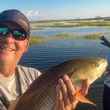

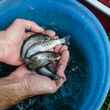
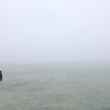
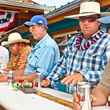

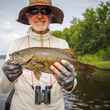
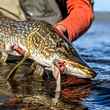
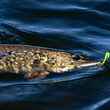
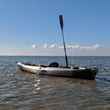

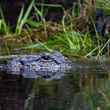


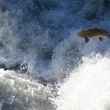

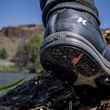
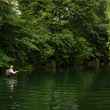
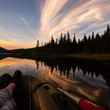
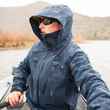

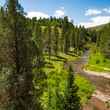
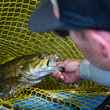
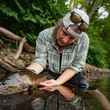
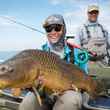

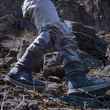
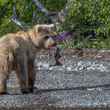
Comments
Brooks Scott replied on Permalink
Kyle, Hannah and the entire crew at Black Earth Angling Co are an absolute pleasure. The fishery there is very special, made more so by their fantastic Midwest hospitality. If you haven’t experienced it, you’re missing out. Highly recommended.
Pages